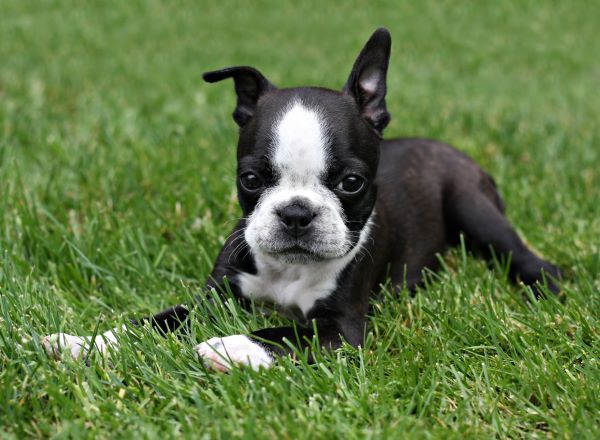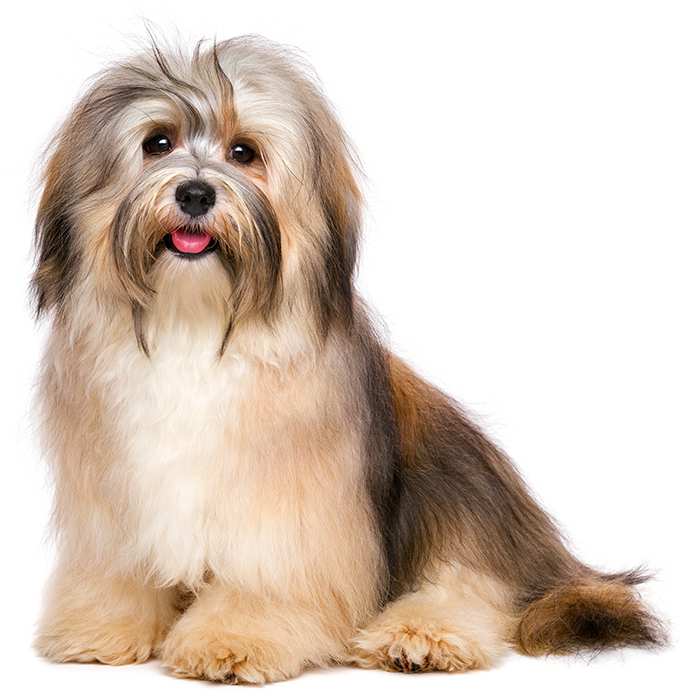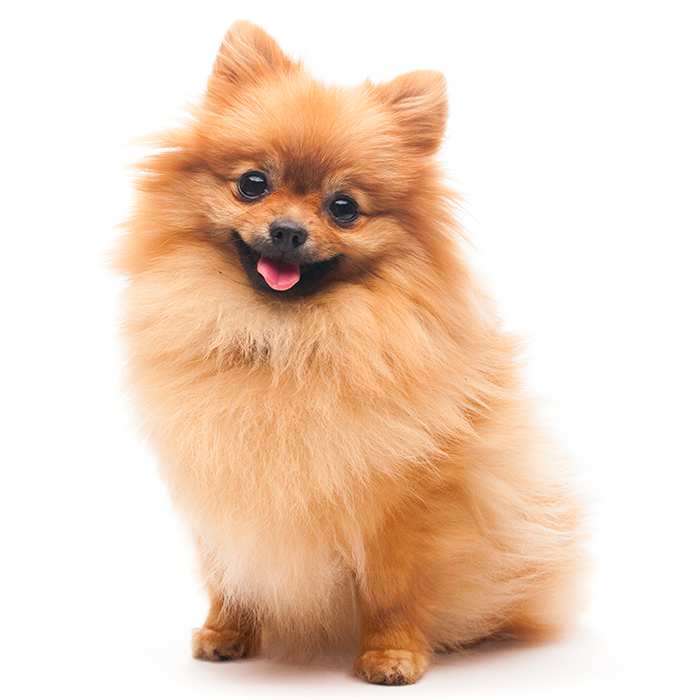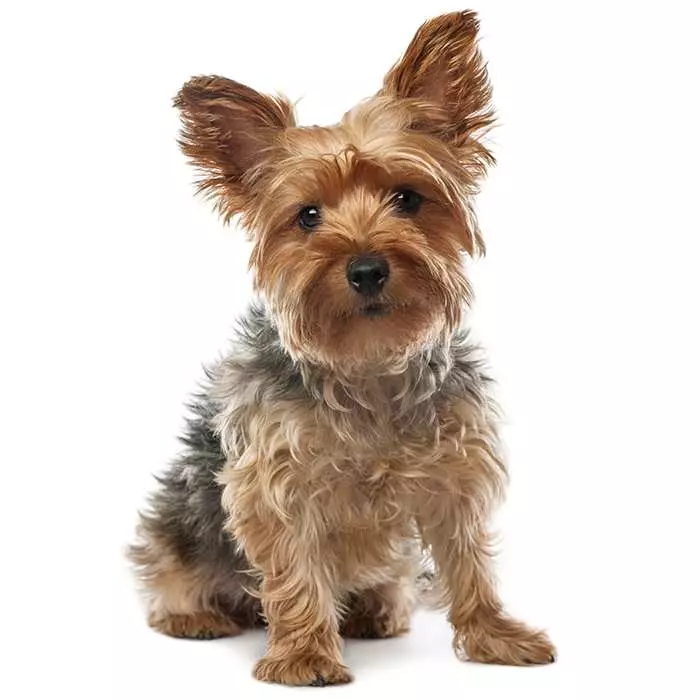Boston Terrier
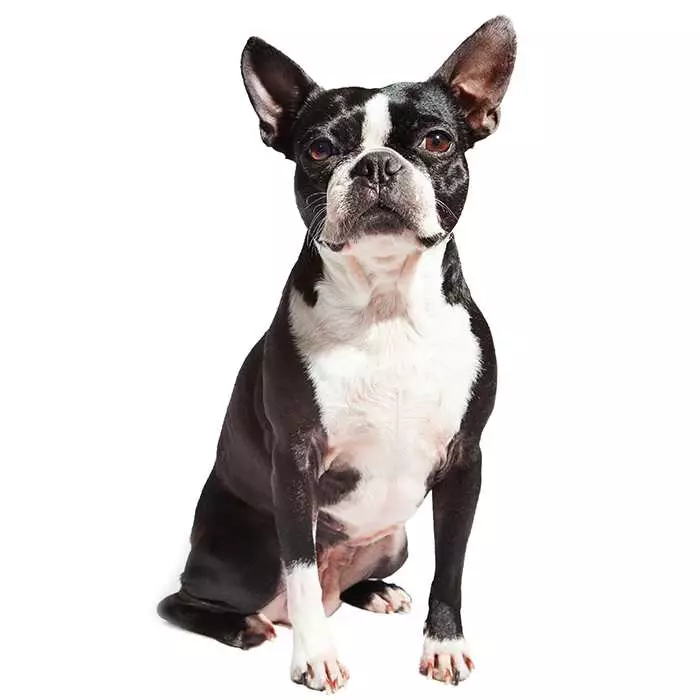

| Recommended for | Families, singles, and seniors |
| Breed Classification | Non-Sporting group |
| Other names | American Gentleman |
| Lifespan | 11 - 15 years |
| Size | Small to medium |
| Temperament | Friendly, affectionate, lively, gentle |
| Intelligence | High; known for being quick learners and generally respond well to training |
| Tendency to bark | Low to moderate; they are not known to bark excessively but may alert if necessary |
| Maintenance Level | Moderate grooming needs, low exercise requirements, regular mental stimulation is beneficial |
| Health Risk | This breed has an around average probability of having health issues in its lifetime, hence it is one of the more affordable breeds to insure. |
Insuring a Boston Terrier?
Get our award-winning Nose-to-Tail Cover with up to $30k annual benefit limit, up to 90% of eligible vet bills back, and no sub-limits.
Get a quick quote
Is this breed right for you?
Try our breed selector quiz to find out your best matching breed!
Insuring a Boston Terrier?
Get our award-winning Nose-to-Tail Cover with up to $30k annual benefit limit, up to 90% of eligible vet bills back, and no sub-limits.
Get a quick quote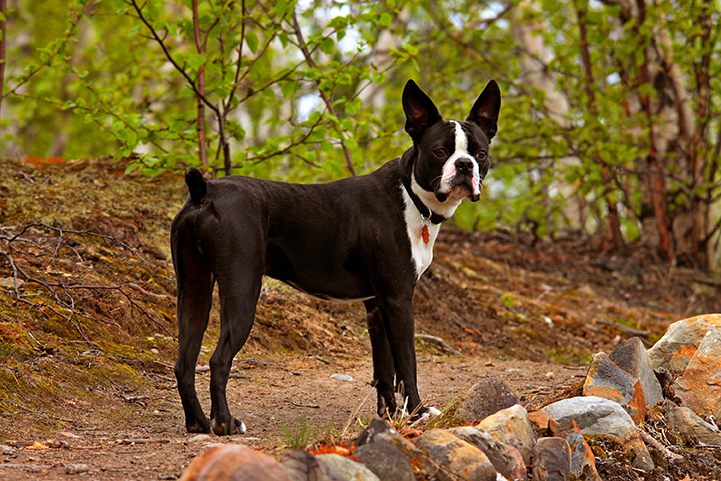
Breed history of Boston Terriers
The Boston Terrier originated in the United States in the late 1800s and was nicknamed the “Little American Gentleman” because of its tuxedo-like coat and well-mannered disposition. Developed in Boston, Massachusetts, this breed resulted from crossbreeding English Bulldogs with now-extinct White English Terriers. The goal was to create a sturdy, compact dog that embodied both strength and a kind nature, suitable as a companion and a family pet.
Initially, Boston Terriers were bred for competitive ratting and as small fighting dogs, but their temperament soon became known for gentleness and affection. This shift led to a rapid change in their primary purpose, and they gained popularity as beloved companions. By 1893, Boston Terriers became one of the first non-sporting breeds recognised by the American Kennel Club, establishing their place in the hearts and homes of families across America.
Strict breeding standards were introduced to preserve the Boston Terrier’s distinctive square head, compact body, and friendly personality. Special attention was given to their iconic black-and-white coat, though other colours like brindle are also recognised. Today, Boston Terriers are popular companions for families and individuals alike. The breed’s reputation has travelled the oceans and has seen a good deal of success in Australia.
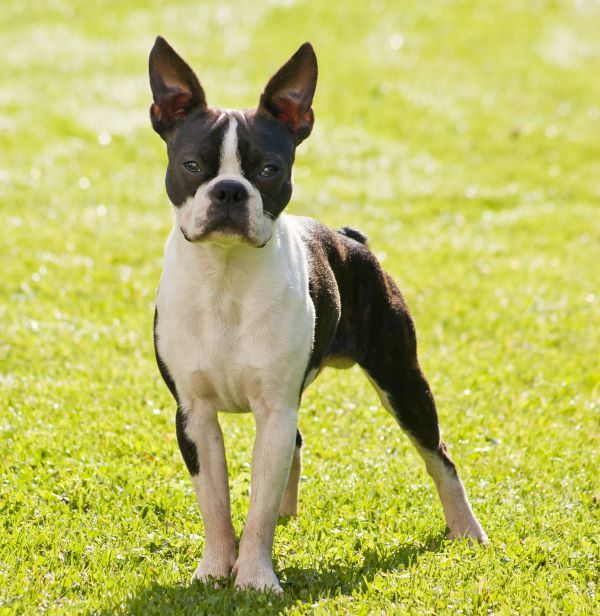
Physical description of Boston Terriers
Boston Terriers are small, compact dogs with a muscular yet well-balanced frame, square head, short muzzle, and large, round eyes that convey a friendly and alert expression. Their erect, bat-like ears and short, smooth coat complete their unique and recognisable look.
The hallmark of the Boston Terrier is its sleek, low-maintenance coat, which comes in a variety of colour combinations, including black and white, seal and white, and brindle and white. Their coat’s tuxedo-like pattern is one of their defining traits and gives the breed a refined and elegant appearance. Despite their refined looks, they are sturdy, agile dogs and capable athletes.
| Weight range | Female: 6–9 kg, Male: 7–11 kg |
| Height range | Female: 35–40 cm, Male: 38–43 cm |
| Colours | Black and white, seal and white, or brindle and white with the distinctive tuxedo-like pattern |
| Coat length | Short, smooth coat that is sleek and low-maintenance |

Boston Terrier personality and temperament
Boston Terriers are affectionate, confident, and lively dogs with a polite and gentle nature, earning them the nickname “American Gentleman”. Their even temperament and playful disposition make them excellent companions for families, singles, and seniors alike. Bostons are highly social and thrive on human interaction, often displaying an engaging and spirited personality that brings joy to their households. Their natural friendliness extends to children and other pets, making them well-suited for family life.
Known for their intelligence and sensitivity, Boston Terriers are quick to learn and keenly attuned to their owner’s emotions. This perceptive nature also makes them effective therapy dogs, as they excel at providing comfort and companionship to those in need. They enjoy learning, especially playing games and working for treats. While they generally respond well to positive reinforcement during training, they can occasionally show a touch of independence.
Boston Terriers adapt well to various living environments, from busy city apartments to quiet rural homes, as long as they receive regular exercise and attention. While they are active and enjoy playtime, they are also content relaxing indoors with their family. Their independent streak allows them to entertain themselves when needed, but they generally prefer staying close to their loved ones, showcasing their loyal and affectionate nature.
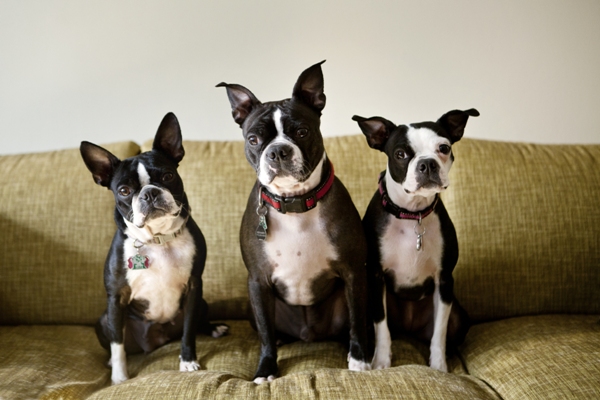
Boston Terriers with kids and other pets
Boston Terriers are gentle, affectionate dogs that thrive in family environments, making them excellent companions for households with children. Their playful and patient temperament allows them to interact positively with kids of all ages. Boston Terriers are known for forming strong bonds with children, often joining in games and adapting well to a lively home. As with all dogs, supervision is recommended during playtime, especially with younger children, to ensure the safety and comfort of both the child and the dog.
Boston Terriers are also sociable and generally friendly towards other pets, especially when introduced early and appropriately socialised. They tend to get along well with other dogs and can often live harmoniously with cats. While they lack a strong hunting instinct, it’s still important to introduce them gradually to smaller pets, reinforcing positive interactions through consistent training. Their sociable nature makes them adaptable to multi-pet households.
In addition to being great family pets, Boston Terriers possess qualities that make them excellent therapy dogs. Their friendly and perceptive nature allows them to provide emotional comfort and joy to individuals in need. Their adaptability and eagerness to please make them well-suited for bringing companionship and support in both home and therapy settings.

Boston Terrier training and exercise
Boston Terriers are lively and intelligent dogs that thrive with regular physical activity and mental stimulation. While they are not overly demanding, daily walks and play sessions are essential to keep them fit and prevent boredom. They enjoy interactive games with their family, such as fetch or puzzle toys, which challenge their minds and provide a healthy outlet for their energy. Their moderate exercise needs and adaptable nature make them suitable for a variety of households, from city apartments to suburban homes.
Training a Boston Terrier is generally a rewarding experience, thanks to their intelligence and eagerness to please. They respond best to positive reinforcement, such as treats and praise, but require consistency and patience to overcome occasional stubbornness. Early socialisation is crucial for building confidence and ensuring they are comfortable around other people, pets, and environments. With the right guidance, Boston Terriers can excel in obedience training and even participate in agility or other dog sports, showcasing their athleticism and sharp minds.
Although Boston Terriers have high energy levels, their exercise needs are moderate, making them adaptable to different lifestyles. They form close bonds with their families and enjoy being involved in daily activities. Their gentle temperament and ability to read emotions also make them well-suited for therapy work, where their affectionate nature and trainability shine.
| Energy level | High |
| Exercise requirements | Moderate |
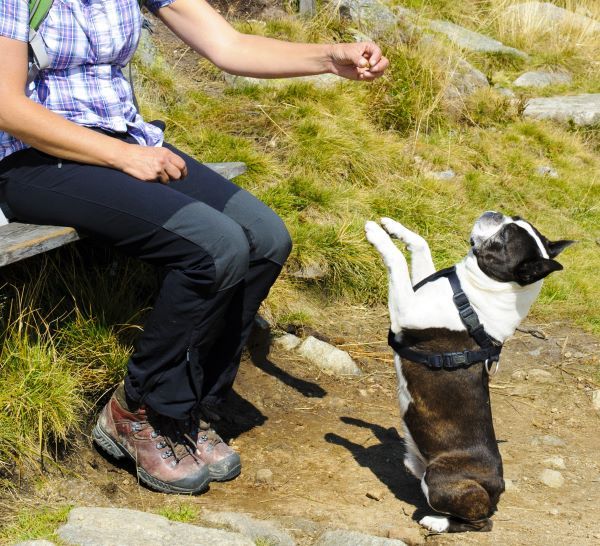
Boston Terrier feeding and nutrition
Proper nutrition is essential for keeping Boston Terriers healthy, energetic, and at their best. Their dietary needs vary based on their age, size, and activity levels. Puppies require a nutrient-dense diet rich in protein and fats to support their growth, while adult Boston Terriers need balanced meals to maintain their energy and lean muscle. Senior dogs benefit from lower-calorie food with added nutrients like glucosamine to support joint health and prevent weight gain.
Monitoring calorie intake is crucial, as Boston Terriers can be prone to weight gain if overfed. Portion control, along with high-quality food formulated for small to medium breeds, helps maintain a healthy weight and prevents obesity-related issues. Regular hydration and ensuring treats don’t exceed 10% of their daily caloric intake are also important. Consulting a veterinarian is key to tailoring a Boston Terrier’s diet to their specific needs.
Regular check-ups ensure your dog’s nutritional requirements are met, and any underlying health concerns are addressed early. A veterinarian can recommend the right food, supplements, and feeding schedules, ensuring your Boston Terrier stays happy and healthy throughout their life.
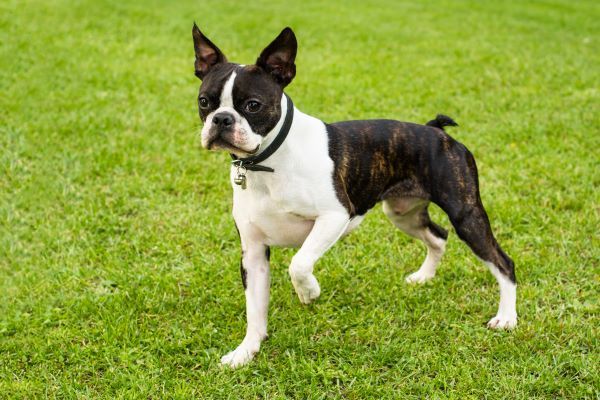
Boston Terrier care and grooming
Boston Terriers have a short, smooth coat that is sleek and low-maintenance, making them one of the easier breeds to groom. Because of their short hair, they shed minimally and do not require extensive grooming, trimming or clipping, making them ideal for busy households.
Grooming Boston Terriers primarily involves regular brushing with a soft-bristled brush to remove loose hairs and keep their coat looking shiny. They should be bathed as needed, typically every four to six weeks, to maintain cleanliness and minimise odours. Nail trimming every few weeks, along with regular dental care to prevent tartar build-up, is essential for their overall health. Their prominent eyes also require attention; gently wiping their eyes and ensuring they stay clean can help prevent irritation or infections.
Health issues for Boston Terriers
- Congenital Heart Disease can occur in dogs and the Boston Terrier is one breed that is susceptible to the condition. Congenital heart disease is genetic and is the malformation of valves in the heart, causing serious problems that will often result in death within the first year of life. Those that have more mild forms of the condition will mostly survive but will show a tendency to avoid exercise, may have stunted growth or will occasionally faint. Cardiac arrest can occur at any time, but in most cases later in the dog’s life.
- Heart Murmurs are common in the Boston Terrier and often reflective of congenital heart disease. A murmur is the sound the heart beat makes when an irregular amount of blood enters one of the heart’s chambers. Heart murmurs can be connected to endocardiosis, endocarditis, valvular stenosis or dysplasia. Many detected heart murmurs will not be severe or require any treatment. Contact your vet for a check-up if your Boston Terrier is showing low exercise tolerance or faints during exercise.
- Brachycephalic Airway Syndrome is a common condition in Boston Terriers due to their short muzzles. This condition can lead to breathing difficulties, snoring, and overheating, especially in hot or humid weather. Genetics play a significant role, but environmental factors like excessive heat or overexertion can worsen symptoms. Keeping your Boston cool and avoiding strenuous activity during hot weather are essential for their comfort and health.
- Patellar Luxation occurs when the kneecap slips out of place, causing discomfort and affecting mobility. This condition is often hereditary but can be exacerbated by obesity or excessive strain on the joints. Regular exercise, weight management, and early monitoring for signs of limping or knee discomfort are crucial in preventing long-term damage.
- Eye conditions such as corneal ulcers and cataracts are prevalent in Boston Terriers due to their prominent eyes. Symptoms may include redness, excessive tearing, or difficulty seeing. Early detection through regular eye exams can help manage these issues and prevent complications like vision loss.
- Cherry Eye is quite common amongst Boston Terriers and is a condition in which a third inverted eyelid is present. The condition can be corrected with care. Often upon examination the vet will have the third eye lid surgically removed.
- Deafness can occur in Boston Terriers, particularly in those with a high percentage of white colouring. This condition is often present from birth and may be detected early through auditory testing. While deafness cannot be cured, affected dogs can adapt well with appropriate training and care.
Not all conditions are covered by Pet Insurance. For details of Bow Wow Meow Pet Insurance cover, refer to the Product Disclosure Statement.
What do Boston Terrier owners claim for the most?
- Corneal Ulcer
- Skin Allergy
- Seizure Disorder
- Patella Luxation
- Faecal Appearance - Abnormal
Thinking about insuring a Boston Terrier
Thinking about insuring a Boston Terrier
Learn moreThinking about insuring a Boston Terrier
Learn moreFree engraved pet ID tag on sign up3
Customer Satisfaction
21 day cooling off
Easy to use Pet Portal

GapOnly® in vet claims
MORE INFORMATION
Boston Terrier Club of NSW Inc: https://bostonterrierclubnsw.com.au/
Queensland Boston Terrier Club: http://www.qldbostonterrierclub.com/
Boston Terrier Club of America: https://bostonterrierclubofamerica.org/

